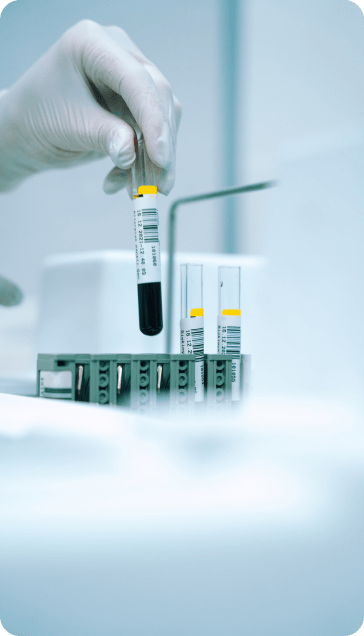
Al Borg Diagnostics
Lactose Intolerance: Important Information
Some individuals experience recurrent digestive problems, which may be related to their lifestyle or dietary choices. These digestive disorders and issues can be associated with lactose intolerance. Continue reading the following article to learn the information and details regarding this condition:
Lactose Intolerance
Lactose intolerance is a condition that occurs when the digestive system cannot break down and digest lactose, which is the sugar found in milk and dairy products.
The inability to digest lactose is due to insufficient production of the enzyme responsible for its breakdown, which leads to digestive disorders and uncomfortable symptoms such as bloating, diarrhea, and gas. In addition, It is essential to know that inability to digest lactose differs from a milk allergy. (1)
Symptoms of Lactose Intolerance
Typically, symptoms of lactose intolerance appear within 30 minutes to two hours after consuming lactose-containing foods. These symptoms may include: (1)(2)
- Diarrhea
- Nausea and vomiting
- Bloating
- Gas
- Abdominal cramps and pain
The severity and intensity of the symptoms depend on the amount of lactose consumed and the amount of lactase enzyme produced by the body.
Causes of Lactose Intolerance
Common causes of lactose intolerance include: (2)(3)
- Genetics: It is expected that individuals may be born unable to digest lactose or develop it later in their teenage years if one of their parents is affected.
- Ethnicity: Africans and Asians are more prone to being unable to digest lactose, with a prevalence of 80% to 99%, whereas the majority is lower in populations of Northern European descent, reaching less than 10%
- Intestinal conditions: The ability of the intestines to produce lactase may be impaired or diminished after experiencing conditions such as minor intestinal diseases or infections, including Crohn’s disease, celiac disease, and ulcerative colitis.
- Premature birth: In many cases, premature infants or babies born before their due date do not produce sufficient lactase enzyme. However, this issue is expected to resolve within a short period.
These are the main points to know about lactose intolerance. Therefore, it is recommended to consult a healthcare professional for diagnosis and guidance on managing the inability to digest lactose symptoms and dietary adjustments.
Diagnosis of Lactose Intolerance
There are several diagnostic options and tests that doctors can utilize to diagnose the inability to digest lactose, such as: (4)(5)
- Hydrogen Breath Test: This test measures the amount of hydrogen and methane gases released by an individual through their breath. Individuals with lactose intolerance will have high levels of these gases because lactose is stored and fermented in the intestines rather than being digested.
- Blood Sugar Test: If the hydrogen breath test does not assist in diagnosing the condition, doctors may perform a blood glucose test. This test measures glucose levels in the blood before and after consuming lactose. If the blood sugar does not rise, it indicates an inability to tolerate lactose.
- Stool Acidity Test: This test is typically conducted for young children and infants. It involves taking a stool sample and analyzing its acidity. A low stool acidity is expected in cases of inability to digest lactose.
If you suspect you may be experiencing lactose intolerance, do not hesitate to visit any Al-Borg Diagnostics branches to undergo these tests. It is worth mentioning that special packages are available for cases of allergies and food intolerance, such as the Food Print (Intolerance) package and the Allergy Package. You can inquire about these packages and choose what suits you, and they provide excellent medical services conducted by trained and qualified medical staff.
Treatment of Lactose Intolerance
There is no way to make the body produce additional lactase enzymes. However, to avoid symptoms, experts usually recommend the following treatment options: (6)
- Avoiding milk and dairy products entirely, including yogurt, cheddar cheese, and Parmesan cheese.
- Opt for low-fat or fat-free dairy products as they contain lower amounts of lactose.
- Lactase enzyme is available in capsules or drops, which can be consumed alongside lactose-containing foods.
- To prevent deficiencies, consider consuming foods rich in calcium, vitamin D, and riboflavin.
References:
- https://www.hopkinsmedicine.org/health/conditions-and-diseases/lactose-intolerance#:~:text=Lactose%20intolerance%20is%20when%20your,your%20body%20can%20absorb%20it.
- https://www.mayoclinic.org/ar/diseases-conditions/lactose-intolerance/symptoms-causes/syc-20374232
- https://www.healthline.com/nutrition/lactose-intolerance-101#getting-tested
- https://my.clevelandclinic.org/health/diseases/7317-lactose-intolerance#diagnosis-and-tests
- https://www.nhs.uk/conditions/lactose-intolerance/
- https://www.healthline.com/health/lactose-intolerance#treatment
Check your health with
Food Print Package

Check your health with
Allergy Package





